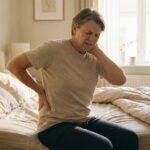
Car and Truck accident injuries: From Trauma to Well-Being
In parts One and Two of this series, we discussed how improving your diet and quitting smoking and adding in exercise will help your recovery. In this final piece of the healing puzzle, we will discuss how to help the healing process mentally after the trauma of injuries from road collisions.
We’ve already noted that healthy fats make you feel good. Here’s why: Your brain is about two-thirds fat and your nervous system is sheathed in myelin, a fatty substance which insulates the nerves. In the same way a diet insufficient in protein makes it harder to build and retain muscle, a low-fat diet often contributes to poor mental health. It’s also important to get rid of bad fats, such as trans fats and processed, refined oils.
The good fats in omega-3 rich salmon and sardines, and the HDLs in grass-fed red meat and butter, plus virgin olive oil and coconut oil really help you build better mental health. Avocadoes and nuts are also a good choice to put beneficial oils into your diet, but use raw tree nuts, not peanuts. Low-saturated fat diets are associated with depression and violence, so try having fish several times a week, and enjoy buttered vegetables, and put a juicy steak on your weekly menu.
Another helpful item for restoring mental well-being is supplemental magnesium. Many of us are low in magnesium due to stress, caffeine, alcohol, diuretics and poor diet. Boosting magnesium ups your serotonin, the “feel-good” hormone, and aids in thousands of other essential biological processes including building bone mass. An added perk is that regular use of magnesium applied to sore muscles will reduce inflammation and pain.
You can take magnesium citrate in tablet form, but magnesium is readily absorbed through the skin and you can apply magnesium “oil” which is a solution of magnesium chloride. Multi-purpose magnesium sulfate, also known as Epsom salts, added to a relaxing bath is another way of getting magnesium while de-stressing.
We’ve already noted that you should have your vitamin D checked and supplement as needed. That walk outdoors will also help you increase vitamin D and help you clear your head. Most of us feel better after exercise, and tired and drained after sitting around, so get out and move to improve your mood! Remember, it’s not “all in your head”. There are often real biological reasons that you are feeling blue. The good news is that dietary fats, exercise, vitamin D , and added magnesium can chase the blues away.
If you are currently prescribed anti-depressants—as are more than 10% of Americans—always consult with your doctor before you reduce the dosage. Chances are that using the tips we have outlined here, you can reduce or get off these medications and have better mental and overall health!
Why do we place emphasis on diet and lifestyle?
Because we know it is important to your healing from your injuries, and at Stillman and Friedland, we care about your recovery from auto and truck accidents.
Call or email jay at: jay@jstillman.com or 1-800-967-2246






